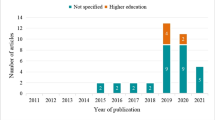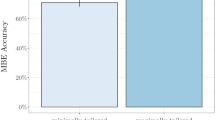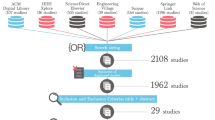Abstract
The goal of this study was to investigate the timing of online homework completion and its effects on student performance. Data was collected from two large, first-semester general chemistry sections at a southwestern university. Specifically, this study aims to explore the link between when students complete their homework relative to the date the material was covered in lecture and student performance in that class. Topics covered in the study included VSEPR, Lewis structures, and molecular geometry. Performance was measured by different variables, namely in-class clicker scores (short-term) and exam grade (long-term). Students were divided into three groups: students who completed the relevant homework within 2 days after the lecture (before the next lecture), those who completed the homework 2 to 4 days after the lecture, and students who completed the homework more than 4 days after the material was covered in lecture. The study also took into consideration student reasoning abilities, as measured by the Test of Logical Thinking (TOLT), with a focus on at-risk students (low TOLT students). Results showed promising findings for low TOLT students. Instructors can employ results from this study to help their students better utilize the online homework resources.
Similar content being viewed by others
References
Bodner, G. M. (1986). Constructivism: a theory of knowledge. Journal of Chemical Education, 63(10), 873–878.
Eichler, J. F., & Peeples, J. (2013). Online homework put to the test: a report on the impact of two online learning systems on student performance in general chemistry. Journal of Chemical Education, 90(9), 1137–1143.
Gönülateş, E., & Kortemeyer, G. (2016). Modeling unproductive behavior in online homework in terms of latent student traits: an approach based on item response theory. Journal of Science Education and Technology, 26(2), 139–150.
Gross, D., Pietri, E. S., Anderson, G., Moyano-Camihort, K., & Graham, M. J. (2015). Increased preclass preparation underlies student outcome improvement in the flipped classroom. CBE-Life. Science Education, 14(4), 8.
Heiner, C. E., Banet, A. I., & Wieman, C. (2014). Preparing students for class: how to get 80% of students reading the textbook before class. American Journal of Physics, 82(10), 989–996.
Jensen, P. A., & Moore, R. (2009). What do help sessions accomplish in introductory science courses? Journal of College Science Teaching, 38(5), 60–64.
Johnson, B. C., & Kiviniemi, M. T. (2009). The effect of online chapter quizzes on exam performance in an undergraduate social psychology course. Teaching of Psychology (Columbia, Mo), 36(1), 33–37.
Korpershoek, H., Kuyper, H., & van der Werf, G. (2015). The relation between students’ math and reading ability and their mathematics, physics, and chemistry examination grades in secondary education. International Journal of Science and Mathematics Education, 13(5), 1013–1037.
Kortemeyer, G. (2016). Work habits of students in traditional and online sections of an introductory physics course: a case study. Journal of Science Education and Technology, 25(5), 697–703.
Lewis, S. E., & Lewis, J. E. (2007). Predicting at-risk students in general chemistry: comparing formal thought to a general achievement measure. Chemistry Education Research and Practice, 8(1), 32–51.
Narloch, R., Garbin, C. P., & Turnage, K. D. (2006). Benefits of prelecture quizzes. Teaching of Psychology, 33(2), 109–112.
Malik, K., Martinez, N., Romero, J., Schubel, S., & Janowicz, P. A. (2014). Mixed-methods study of online and written organic chemistry homework. Journal of Chemical Education, 91(11), 1804–1809.
Osborne, R. J., & Wittrock, M. C. (1983). Learning science: a generative process. Science Education, 67(4), 489–508.
Perdian, D. C. (2012). Early identification of student performance and effort using an online homework system: a pilot study. Journal of Science Education and Technology, 22(5), 697–701.
Piaget, J. (1977). The development of thought: equilibrium of cognitive structures. New York: Viking Publishing.
Richards-Babb, M., Curtis, R., Georgieva, Z., & Penn, J. H. (2015). Student perceptions of online homework use for formative assessment of learning in organic chemistry. Journal of Chemical Education, 92(11), 1813–1819.
Richards-Babb, M., Curtis, R., Smith, V. J., & Xu, M. (2014). Problem solving videos for general chemistry review: students’ perceptions and use patterns. Journal of Chemical Education, 91(11), 1796–1803.
Rodriguez, R. P., & Smith, L. M. (2016). Using an online homework management system in tax accounting: does it advance learning? International Journal of Learning Technology, 11(1), 44–65.
Sweller, J. (1988). Cognitive load during problem solving: effects on learning. Cognitive Science, 12(2), 257–285.
Tobin, K. G., & Capie, W. (1981). The development and validation of a group test of logical thinking. Educational and Psychological Measurement, 41(2), 413–423.
Vining, W., Young, S., Day, R., & Botch, B. (2016). General chemistry. Boston: Cengage Learning.
von Glasersfeld, E. (1995). Radical constructivism. London: Falmer Press.
Williamson V. M. in Bunce D. and Cole R., (ed.) (2008). Nuts and bolts of chemical education research, Washington, DC: American Chemical Society. pp. 67–78
Williamson, V. M., & Zumalt, C. J. (2017). How do general chemistry students’ impressions, attitudes, perceived learning, and course performance vary with the arrangement of homework questions and E-text? Chemistry Education Research and Practice, 18(4), 785–797.
Author information
Authors and Affiliations
Corresponding author
Ethics declarations
All procedures performed in studies involving human participants were in accordance with the ethical standards of the institutional and/or national research committee and with the 1964 Helsinki declaration and its later amendments or comparable ethical standards.
Informed Consent
Informed consent was obtained from all individual participants included in the study.
Additional information
Publisher’s Note
Springer Nature remains neutral with regard to jurisdictional claims in published maps and institutional affiliations.
Rights and permissions
About this article
Cite this article
Cosio, M.N., Williamson, V.M. Timing of Homework Completion vs. Performance in General Chemistry. J Sci Educ Technol 28, 523–531 (2019). https://doi.org/10.1007/s10956-019-09783-x
Published:
Issue Date:
DOI: https://doi.org/10.1007/s10956-019-09783-x




